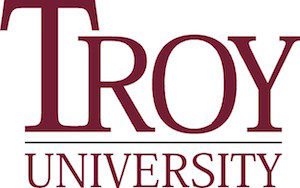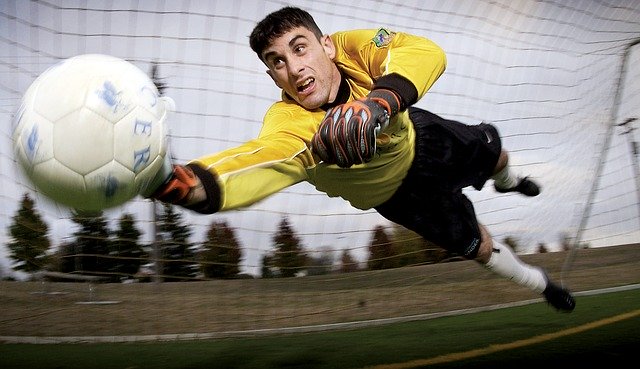Online Masters in Sports Management
 Southern New Hampshire University rounds out this year’s ranking of the best online masters in sports management degree programs. We like this program due to its interdisciplinary nature and nationally-known name. Some additional selling points of the program include reports of great networking opportunities as well as many alumni who have succeeded in sports management roles at the highest levels.
Southern New Hampshire University rounds out this year’s ranking of the best online masters in sports management degree programs. We like this program due to its interdisciplinary nature and nationally-known name. Some additional selling points of the program include reports of great networking opportunities as well as many alumni who have succeeded in sports management roles at the highest levels.
Courses for this degree program may be tailored slightly with a choice of electives. The general core, however, is well rounded and provides a multidisciplinary look at sports management. Courses within the core include internationalization in sports, sports and society, sports marketing, sports finance, research methods, and a final capstone project. Many start dates, slightly accelerated courses, and a lenient transfer-in policy make this program particularly adult learner friendly.
About Southern New Hampshire University
Southern New Hampshire University is a private, nonsectarian university with the main campus in rural New Hampshire. While courses are taught on campus, the university has the designation as being one of the largest not-for-profit online universities. With a student body of over 90,000 students, over 87,000 of these students actually attend 100% online.
 What Can You Do With a Master’s in Sports Management?
What Can You Do With a Master’s in Sports Management?
In general, there are two sides to sports management organizations. There are those involved directly with the performance, strategy and management of athletes, and those working within sports from a business perspective. In smaller organizations, these roles may overlap. But in larger organizations, they’re separated. Below we’ll highlight some of the roles in both of these camps.
Coaches, nutritionists, fitness instructors, and analysts work alongside athletes to enhance performance and manage outcomes. Roles such as coaching often depend on past experience with the sport in question, an issue separate from gaining a master’s degree. For other roles within this “camp,” however, a master’s in sports management may help you to gain employment. This is particularly the case if you can find a sports management degree with a specialization in coaching, fitness, or the role you’re seeking.
The roles that a master’s in sports management typically prepare graduates for are roles within the business office of a sports organization. These roles mirror those of many organizations and may include public relations, marketing, logistics, operations, finance, accounting, and so forth. With that said, sports, recreation, and hospitality and separate from other industries. Taking coursework that applies directly to sporting situations can give you a leg up over competition for the same positions.
How Much Do Sports Administrators Make?

First off, what is a sports administrator?
As is the case for business “administration” degrees, sports administrators perform administrative tasks in a wide range of disciplines for a sporting organization. Administrative tasks could deal with raising funds, or marketing, or public relations, and so forth. Basically, sports administrators are businessmen (or women) who help to keep sports organizations relevant, profitable, and on-mission.
Because there is such a wide range of tasks performed, as well as sizes of different sports organization operations, the answer to how much sports administrators make varies widely. As one may expect, an administrator (likely also a coach) selling ads for a high school baseball team won’t make close to an advertising manager for an MLB team.
What we can provide, however, are ballpark estimates. Typically, roles for professional teams and leagues are in line payment wise with work for other corporations within the region of employment.
For some of the most popular roles, major salaries include:
 Marketing Manager for MLB Team: $90,000
Marketing Manager for MLB Team: $90,000- Finance Manager for NBA Team: $97,000
- Public Relations Manager for NCAA D1 Football: $60,000
- General Manager NFL Team: $2,000,000
What Schools Offer Sports Management Programs?
Historically there have been coaching, fitness, and recreation degrees, and then there have been business-centered degrees. In recent years, however, with many schools growing the number of specialty degrees they offer, a range of sports management degrees have cropped up.
Sports management degrees are typically most common at the graduate level, particularly as master’s degrees. The most common degree types that can be broadly construed as sports management include the following:
 Masters in Sports Management
Masters in Sports Management- MBA in Sports Management
- Masters in Sports Marketing
- Masters in Coaching
- Masters in Sports Leadership
- Masters in Recreation Management
While sports management degree programs still aren’t the most common of degrees, and many working within sports management fields will have instead opted for general management or business degrees, there are a growing number of programs. That we’ve seen in our year’s researching higher education at OnlineCollegePlan, there are likely close to 100 colleges and universities that offer sports management programs. This means that while not every school has a program (or even close), typically there are sports management programs at least close to every state and metro area.
What Kinds of Jobs Can You Get With a Sports Management Degree?
 Sports management jobs are divided into field-related duties and a sports organization’s “front office.” In smaller organizations, there is often a great deal of overlap between these types of positions. Coaches will also market their organization, or assistant coaches may also help with fitness or nutrition. Or general managers may perform routine accounting tasks.
Sports management jobs are divided into field-related duties and a sports organization’s “front office.” In smaller organizations, there is often a great deal of overlap between these types of positions. Coaches will also market their organization, or assistant coaches may also help with fitness or nutrition. Or general managers may perform routine accounting tasks.
In larger organizations, roles are more specialized. Among college and professional athletic organizations, some of the most common roles related to on-the-field performance include:
- Player Scouts
- Performance Analysts
- Coaching Staff
- And Health Support workers
While a sports management degree may help within all of these roles, and many in these roles do hold sports management degrees, these degrees are more directly tied to “front office” jobs. Common front office jobs:
- Marketing Manager
 Finance Manager
Finance Manager- Fundraising Manager
- Accounting Manager
- Public Relations Manager
- Project Managers
- Business Analyst
- General Manager
As all of the roles listed above are positions that apply one business or management discipline to a sporting context, a degree that blends the two worlds (such as sports management) is a great choice. There are of course other things you can do with a sports management degree, such as starting your own business or fill a role unrelated to sports, but above are some of the main options.
How Much Money Can You Make With a Sports Management Degree?

Sports are big business, and some of the top managers in the game make millions of dollars a year. While no single degree can prepare you to be a general manager of a major franchise, sports management degrees are one of the most surefire ways to get your foot in the door at a sports organization, or to advance further into management within a sports management vertical.
We’ll take a look at some of the most common roles within sports management organizations below. Just keep in mind that there are wide ranges for salaries depending on the level of organization you are working at (youth, college, professional, etc.) as well as the location in which you are working.
Common “Front Office” Sports Management Salaries
- Marketing Manager for MLB Team: $90,000
- Finance Manager for NBA Team: $97,000
- Public Relations Manager for NCAA D1 Football: $60,000
- Fundraising Manager for NCAA D1 Football: $97,891
- Business Analyst for NBA Team: $94,000
Related Rankings
Didn’t find what you were looking for? Check out some of our resources related to online masters in sports management degrees above.
 The best online masters in sports management degrees help to “level up” both current coaches and those seeking to break into the business side of sports management.
The best online masters in sports management degrees help to “level up” both current coaches and those seeking to break into the business side of sports management. Masters in sports management
Masters in sports management
 Masters in sports management
Masters in sports management Our top online masters program featured in this ranking is the sports medicine degree at Drexel University. Recently, Drexel made a vast improvement to this program seeking to match industry expectations. This truly innovative school is known to change with the times, and that is apparent once again with this degree. The degree mixes essential sports management courses with their world-renowned business curriculum preparing you for a vast number of career opportunities- something you will need in this evolving and competitive field.
Our top online masters program featured in this ranking is the sports medicine degree at Drexel University. Recently, Drexel made a vast improvement to this program seeking to match industry expectations. This truly innovative school is known to change with the times, and that is apparent once again with this degree. The degree mixes essential sports management courses with their world-renowned business curriculum preparing you for a vast number of career opportunities- something you will need in this evolving and competitive field. One of our top choices for the best online masters in sports management is this program from North Carolina State University- Raleigh. Over 90% of students are able to complete this online program in just two years. Each semester is 7-weeks and courses are taken one at a time. Students generally complete 2 courses in 15 weeks for a total of 31 credit hours. No GRE is required for admittance to this degree. We like this program for the accelerated course format.
One of our top choices for the best online masters in sports management is this program from North Carolina State University- Raleigh. Over 90% of students are able to complete this online program in just two years. Each semester is 7-weeks and courses are taken one at a time. Students generally complete 2 courses in 15 weeks for a total of 31 credit hours. No GRE is required for admittance to this degree. We like this program for the accelerated course format.






 The Masters in Sports Administration from Canisius College ranked highly for its flexible and accelerated programming. Students have the option to complete this course online or in-person meaning you have the flexibility to choose a delivery style that best suits your own personal learning needs. The online degree is much quicker only requiring 33 credit hours for completion and may be completed in as little as one year. If you need an accelerated program, the program at Canisius may the most accelerated program offered.
The Masters in Sports Administration from Canisius College ranked highly for its flexible and accelerated programming. Students have the option to complete this course online or in-person meaning you have the flexibility to choose a delivery style that best suits your own personal learning needs. The online degree is much quicker only requiring 33 credit hours for completion and may be completed in as little as one year. If you need an accelerated program, the program at Canisius may the most accelerated program offered.




 The Online Master of Science in Sport Management from Old Dominion is ranked near the top of the list because this program is a great fit for individuals looking to study online. This is relatively affordable for both in-state and out-of-state students. The degree in itself is just 36 credit hours in length along with a capstone initiative. The capstone options include an internship or a thesis. Those who pursue an internship are required to complete a comprehensive exam before starting their internship.
The Online Master of Science in Sport Management from Old Dominion is ranked near the top of the list because this program is a great fit for individuals looking to study online. This is relatively affordable for both in-state and out-of-state students. The degree in itself is just 36 credit hours in length along with a capstone initiative. The capstone options include an internship or a thesis. Those who pursue an internship are required to complete a comprehensive exam before starting their internship.
 One of our top picks is the Master of Arts in Sports Management from Fresno Pacific University for a number of reasons including their comprehensive academic programming. Whether you are ready to advance your career or start afresh in sports management, this program is a great fit. The program is just 30 credit hours long and is divided into two main parts- 21 credits of sports courses, and then 9 credit hours to satisfy the master of arts requirements. Those courses are strongly centered around kinesiology including the legal aspects of kinesiology and sport.
One of our top picks is the Master of Arts in Sports Management from Fresno Pacific University for a number of reasons including their comprehensive academic programming. Whether you are ready to advance your career or start afresh in sports management, this program is a great fit. The program is just 30 credit hours long and is divided into two main parts- 21 credits of sports courses, and then 9 credit hours to satisfy the master of arts requirements. Those courses are strongly centered around kinesiology including the legal aspects of kinesiology and sport.









 One of our favorite online masters in sports administration degrees for this year may be seen in Fairleigh Dickinson University’s program. We like this program for its nationally known name, the fact that students may choose between different specializations and rigorous admissions standards within the program. Additionally, a 50% scholarship is available to all applicants, talk about a great deal!
One of our favorite online masters in sports administration degrees for this year may be seen in Fairleigh Dickinson University’s program. We like this program for its nationally known name, the fact that students may choose between different specializations and rigorous admissions standards within the program. Additionally, a 50% scholarship is available to all applicants, talk about a great deal! One of the unique offerings in our ranking of the best online masters in sports management is presented by Belhaven University. This MBA with a sports administration concentration provides a great choice for the right kind of candidate due to the slight program differences in an MBA and MS, the nationally known name of Belhaven, and the adult student support services in place with the program.
One of the unique offerings in our ranking of the best online masters in sports management is presented by Belhaven University. This MBA with a sports administration concentration provides a great choice for the right kind of candidate due to the slight program differences in an MBA and MS, the nationally known name of Belhaven, and the adult student support services in place with the program.
 Jackson State University provides a unique entrance into sports administration without a masters in sports management degree. Their program in sports science with a concentration in sports management blends science behind the players themselves as well as conditions surrounding “the field” such as marketing, finance, and governing bodies.
Jackson State University provides a unique entrance into sports administration without a masters in sports management degree. Their program in sports science with a concentration in sports management blends science behind the players themselves as well as conditions surrounding “the field” such as marketing, finance, and governing bodies.
 One of our favorite picks for this year’s best online masters in sports management degree is offered by Lasell University. This program caught our eye due to the well-known name of the parent institution, flexibility-granting program components, support for adult learners, and the range of specializations offered within the program.
One of our favorite picks for this year’s best online masters in sports management degree is offered by Lasell University. This program caught our eye due to the well-known name of the parent institution, flexibility-granting program components, support for adult learners, and the range of specializations offered within the program.
 Wesley College offers one of the best online masters in sports management degrees of this year’s ranking. We liked this program due to its highly customizable nature, accelerated courses, and the fact that students may choose from several related academic programs depending on their needs. Additionally, the program is one of the more affordable for those surveyed for this year’s ranking.
Wesley College offers one of the best online masters in sports management degrees of this year’s ranking. We liked this program due to its highly customizable nature, accelerated courses, and the fact that students may choose from several related academic programs depending on their needs. Additionally, the program is one of the more affordable for those surveyed for this year’s ranking.
 Troy University provides one of our top picks for this year’s online masters in sports management degree program ranking. Their unique program broadens sport to focus also on the range of support services in fitness management. This well-established program has alumni working in many of the most prestigious sports management settings in the US (and abroad) including the NBA, the NFL, and numerous Division I collegiate departments.
Troy University provides one of our top picks for this year’s online masters in sports management degree program ranking. Their unique program broadens sport to focus also on the range of support services in fitness management. This well-established program has alumni working in many of the most prestigious sports management settings in the US (and abroad) including the NBA, the NFL, and numerous Division I collegiate departments.
 Saint Leo University’s MBA program places in this year’s ranking of the best online master’s in sports management degree programs. While MBAs are lacking in courses on coaching (in an athletic way), they’re one of the most versatile degrees you can get for advancing in a business and management organization such as many large sporting bodies are.
Saint Leo University’s MBA program places in this year’s ranking of the best online master’s in sports management degree programs. While MBAs are lacking in courses on coaching (in an athletic way), they’re one of the most versatile degrees you can get for advancing in a business and management organization such as many large sporting bodies are.
 One of our favorite programs we’ve seen in this year’s ranking of the best online masters in sports management is offered by Western Kentucky University. This recreation and sports administration degree (with a focus area in both athletic administration and coaching) has everything you could wish for in joining either “side” of an athletic organization.
One of our favorite programs we’ve seen in this year’s ranking of the best online masters in sports management is offered by Western Kentucky University. This recreation and sports administration degree (with a focus area in both athletic administration and coaching) has everything you could wish for in joining either “side” of an athletic organization.
 Indiana State University’s master’s sports management program is one of our picks for this year’s ranking of the best online masters in sports management. Elements of this program that we like include good financial aid support, the nationally-known name of the parent university, and quality academic programming. Students must complete an internship at the end of their course of study, helping to bridge the gap between theoretical and real-world sports management work.
Indiana State University’s master’s sports management program is one of our picks for this year’s ranking of the best online masters in sports management. Elements of this program that we like include good financial aid support, the nationally-known name of the parent university, and quality academic programming. Students must complete an internship at the end of their course of study, helping to bridge the gap between theoretical and real-world sports management work.
 Franklin Pierce University offers one of a handful of MBA’s to make our list of the best online master’s in sports management. Sports management comprises many roles from coach through marketing, finance, public relations, leadership, and so forth. MBAs are some of the only degree types that give graduates exposure to such a wide range of disciplines. In short, they prepare students to join a sports management organization and excel in nearly any role. The same can be said of Franklin Pierce’s sports management MBA.
Franklin Pierce University offers one of a handful of MBA’s to make our list of the best online master’s in sports management. Sports management comprises many roles from coach through marketing, finance, public relations, leadership, and so forth. MBAs are some of the only degree types that give graduates exposure to such a wide range of disciplines. In short, they prepare students to join a sports management organization and excel in nearly any role. The same can be said of Franklin Pierce’s sports management MBA.
 Few online masters in sports management rankings would be complete without mention of the United States Sports Academy. While not a traditional school with degrees in a range of other topics, this specialty school is regionally accredited and offers a range of top-notch master’s level degrees related to sports management.
Few online masters in sports management rankings would be complete without mention of the United States Sports Academy. While not a traditional school with degrees in a range of other topics, this specialty school is regionally accredited and offers a range of top-notch master’s level degrees related to sports management.
 Tiffin University provides one of the final MBA with sports management concentration programs we’ve included in this year’s ranking of the best online master’s in sports management programs. For many graduates seeking jobs in sports management, MBAs are great “fits” because they allow students to gain their footing in a wide variety of subjects. If your end goal is to work in sports management, you may need to be adaptable and be willing to take a job in a range of business positions related to sports management. MBAs can prepare you for just this.
Tiffin University provides one of the final MBA with sports management concentration programs we’ve included in this year’s ranking of the best online master’s in sports management programs. For many graduates seeking jobs in sports management, MBAs are great “fits” because they allow students to gain their footing in a wide variety of subjects. If your end goal is to work in sports management, you may need to be adaptable and be willing to take a job in a range of business positions related to sports management. MBAs can prepare you for just this.
 California University of Pennsylvania offers one of the most unique offerings we’ve seen in this year’s ranking of the best online masters in sports management degree programs. CalU notes that their program is the first 100% online sports management studies program. The key difference between sports management and sports management studies is that the second option is more interdisciplinary. This fact shows through the range of specializations available in the program.
California University of Pennsylvania offers one of the most unique offerings we’ve seen in this year’s ranking of the best online masters in sports management degree programs. CalU notes that their program is the first 100% online sports management studies program. The key difference between sports management and sports management studies is that the second option is more interdisciplinary. This fact shows through the range of specializations available in the program. Southern New Hampshire University rounds out this year’s ranking of the best online masters in sports management degree programs. We like this program due to its interdisciplinary nature and nationally-known name. Some additional selling points of the program include reports of great networking opportunities as well as many alumni who have succeeded in sports management roles at the highest levels.
Southern New Hampshire University rounds out this year’s ranking of the best online masters in sports management degree programs. We like this program due to its interdisciplinary nature and nationally-known name. Some additional selling points of the program include reports of great networking opportunities as well as many alumni who have succeeded in sports management roles at the highest levels. What Can You Do With a Master’s in Sports Management?
What Can You Do With a Master’s in Sports Management?
 Marketing Manager for MLB Team: $90,000
Marketing Manager for MLB Team: $90,000 Masters in Sports Management
Masters in Sports Management Sports management jobs are divided into field-related duties and a sports organization’s “front office.” In smaller organizations, there is often a great deal of overlap between these types of positions. Coaches will also market their organization, or assistant coaches may also help with fitness or nutrition. Or general managers may perform routine accounting tasks.
Sports management jobs are divided into field-related duties and a sports organization’s “front office.” In smaller organizations, there is often a great deal of overlap between these types of positions. Coaches will also market their organization, or assistant coaches may also help with fitness or nutrition. Or general managers may perform routine accounting tasks. Finance Manager
Finance Manager
